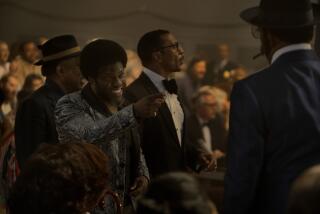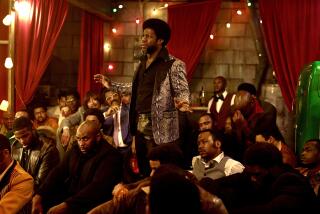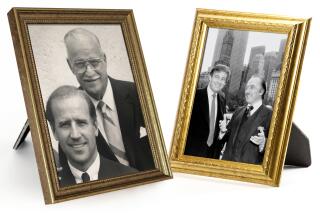Muhammad Ali’s eldest daughter remembers her father
To the world, Muhammad Ali was the brash and buoyant heavyweight fighter bestowed with many monikers: the floating butterfly, the Louisville Lip, the Greatest.
To Maryum Ali, the eldest of the boxer’s nine children, he was “all of the above,” she said. But he was also a teacher, a spiritual guide. Above all, he was Dad.
Maryum Ali, 47, the daughter of the fighter’s second wife, Khalilah Ali, was very close to her father. She would regularly drive from her home in Los Angeles to visit him at his home in Arizona, she said.
Affectionately known as May May, Ali has worked as a standup comedian, a rapper and is currently executive director of a nonprofit that focuses on gang prevention and youth development. She was at her father’s bedside along with other family members when he died Friday at a Phoenix hospital, where he had been moved because of a respiratory illness. Diagnosed with Parkinson’s more than 30 years ago, Muhammad Ali was 74.
On Sunday, Maryum Ali shared memories of her father with The Times, often still referring to him in the present tense, because “his energy is present,” she said. “It will always be around.”
What is your fondest childhood memory of your father? What was he like as a dad?
There are a lot of fond memories. It very hard to say what the fondest moment is, but I would say the most special for me were the spiritual moments, when we made prayer together and when we worshiped and went to our Islamic services together and we talked about faith and the hereafter and God. Those really are the best moments for me. Those are the moments that built my foundation as a person, because I knew those were the moments that were very real. They were purposeful. And those were the moments I knew would give me strength and allow me to become the woman that I am. And I knew that as a young person. I was an old soul. I loved those kind of conversations about our spirit and about our purpose in life. For me, those were the best moments with my dad.
How would you characterize your father?
He was Dad, but he was all the other things that people know him for too to us. We are very cognizant of who he was. We knew he was the activist, the athlete, the spiritual leader, the humanitarian.
My father has many sides, like most people do. My father is a gregarious person. He’s upbeat. He has a positive, optimistic outlook on life. He’s a generous person, and loving. He simply loves people. So when people came to visit him in his hotel suite or came up to him on the street, he would look them dead in the eye and [say], “What’s your name, how ya doing.” He loved the energy of people.
Everyone who talked to him or dealt with him in some way, shape, form or fashion remembers the human qualities of him.
They called him the peoples’ champ. That what makes him so beloved. My father really was a ball of love. He really exuded that love to even a stranger. He didn’t treat that stranger as inferior. I am just so happy that I was able to experience that quality as a girl looking up and seeing him interact with people.
What did he teach you?
The beauty of him is that he made time and made it a priority to be a good father. So the time he had with us, he was really trying to build up our character. I’m the woman that I am today because of him. I really listened to his lessons: How to be a respectful woman, how not to let men chip away at your esteem, how not to get involved in the dark side of society, in bad habits; stay healthy, watch who your friends are.
And what’s most important for me is that I love my religion of Islam. I stand up for being a Muslim, with all the craziness going on, all the negativity in this country about who Muslims are. I am proud to be a Muslim and unapologetic because of my father. He was going to give up his boxing profession for his faith. That was a beautiful example to have guide me.
What do you think about boxing and did you ever attend any of your father’s bouts?
I admired my dad as a boxer. I admired his skill. I admired the way in which he promoted his fights, his discipline and dedication. I was able to witness that. I did go to fights. I remember going to the Kenny Norton fight at Madison Square Garden [1973] where [Dad] got his jaw broken. I remember going to the fight with Jerry Quarry [1970] and to his last fight with Trevor Berbick [in 1981], and to the second Leon Spinks fight in Louisiana [1978]. So I was a fight fan.
Were you ever worried about him fighting because of the threat of Parkinson’s?
Fighting alone doesn’t cause Parkinson’s. You can’t prove that that’s the cause because a lot of boxers don’t have Parkinson’s. I believe it might have been a combination of head trauma from boxing and pesticides. He was exposed to a lot of pesticides at the Deer Lake [Penn.] training camp. My theory is that [his Parkinson’s] started with the pesticides and it possibly could have been drawn out by the head trauma. That’s not a definite proven cause. You can only theorize.
Were there ever any regrets on your part or the part of your siblings that boxing could have caused your father to be afflicted by Parkinson’s?
No, there are no regrets. He wouldn’t have been Muhammad Ali if there were any changes to his history. No changes to his history should be made. He is getting the coverage that he’s getting and he is beloved the way he is because of the trajectory of his life and what happened in his life. So we wouldn’t change anything about his life.
How do you think he would like to be remembered?
I really think he just wanted to be seen as a human being who loved humanity, who wanted to fight for humanity, for all people. When you look at religious wars, when you look at racial tensions, all of that is divisiveness. And it comes in many shapes and forms: the pretty, the ugly, the black, the white. My father, through the essence of what he was, thought there should be no divisions, that this is wrong, that this is not what God wants. God made all of us beautiful in his image. Outside of the ring, that’s what he was about. And that’s how he wants to be remembered. A man who used his celebrity, who used his God-given talent to propagate the idea that we should not be divided as the human race in any way, shape or form. To me that’s the essence of him.
What was your last memorable exchange with your father?
We celebrated his 74th birthday on Jan. 17. My sister Rasheda put together a family pictorial slide show of the grandkids and the kids and we were just having fun. That’s such a blessing that his last big family gathering was with everybody at his house. We were just celebrating his birthday, celebrating his life.
ALSO
To Muslims the world over, Muhammad Ali was ‘#TheGreatest’
Muhammad Ali’s pop culture reach went far outside the boxing ring
Muhammad Ali dies at 74; boxing champion became worldwide celebrity
More to Read
Sign up for Essential California
The most important California stories and recommendations in your inbox every morning.
You may occasionally receive promotional content from the Los Angeles Times.











